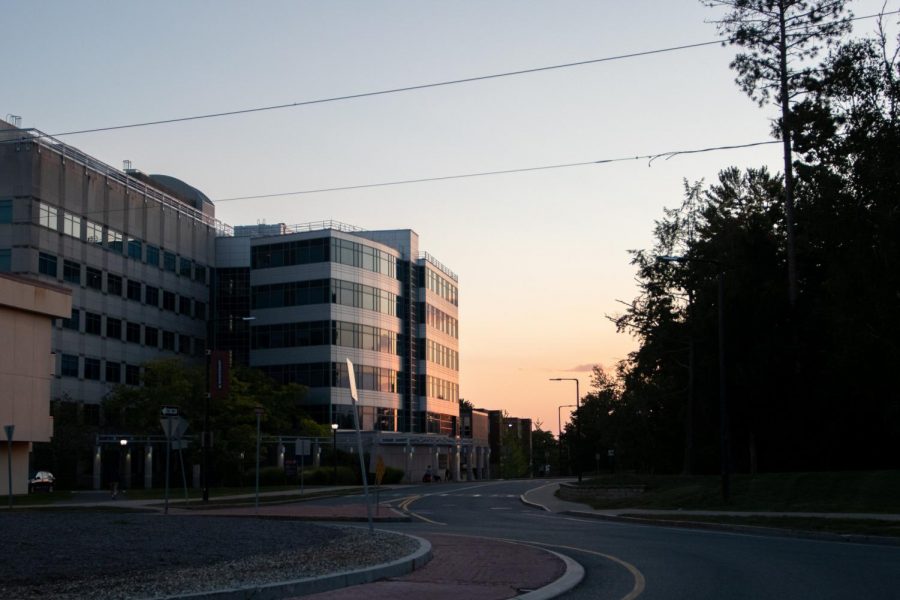On March 13, 2020 the World Health Organization declared COVID-19 a pandemic, throwing the course of everyone’s lives for a loop. Countries were shutting down across the world, and in the United States, people scrambled for toilet paper and food, not knowing what was to come next.
On that same day, the University of Massachusetts Amherst announced that campus would be closed for the rest of the semester, after announcing earlier that same week that there would be a two-week extension to spring break.
A year later, students wear masks as second nature, follow social distance guidelines and work and attend classes on a computer.
In the fall semester, UMass opened its residence halls to those with special circumstances as well as students who had in-person classes. Now, in the spring semester, UMass invited back any students to reside in residence halls and are providing more classes in a hybrid form.
Riley Linden, a freshman management major, said he does not mind online school. Looking at a screen for most of the day, “although it’s probably not good for me, it doesn’t affect me that much.”
Linden was a senior in high school when COVID-19 entered the United States. At first, he said he thought it would be another vacation. But as time went on, he realized that it was more serious.
Jacob D’Ambrosio, a sophomore transfer student and marketing major, said he remembers his resident assistant was cautious weeks before and told his residents to get ready.
“He encouraged everyone to wear masks. I was kind of wearing masks and wore them to class, but I got weird stares,” D’Ambrosio said.
D’Ambrosio added he knew they were going to get sent home but was not sure for how long. “It was definitely surreal; we were still going out.”
As a former UMass Boston student, he also reflected on how being in the city at the start of the pandemic was strange and seeing the scene of Boston transform into a “ghost town.”
“I went back that following Thursday to pick up my stuff, and the city went from being super robust and super populated to being a ghost town, and it was such strange atmosphere.” D’Ambrosio said.
Being a transfer student, D’Ambrosio said he applied on a whim knowing Isenberg is a good business school and wanted a better networking experience since he thought he would be getting his degree online.
“If you told me a year ago today that I was going to be in Amherst I would be shocked, I would not believe you,” D’Ambrosio added.
Amanda Kessler, a sophomore communication major, said that at first it was interesting because many people thought the virus was a joke, but once UMass sent everyone home, it became much more real.
Kessler said that it was a shock to not go to class every day and struggled a lot at first. “I love being in-person and talking to people and getting questions answered with the professor being right there.”
Greeley Kyle, a journalism lecturer, said that a lot of changes needed to be made “on the fly” at first.
“It required a lot of shuffling as a lecturer. It also required a lot of restructuring things so that the class could have the same content, but at variable instruction methods,” Kyle said.
Kyle teaches in-person classes this semester, as well as last semester. His classes require mainly performance work and he said that last semester started off really well and students were able to stay safe.
Due to difficulties this year, Kessler said that it was not just her approach to school that changed.
“Even though COVID is a negative time, I found personal development. Listening to podcasts helped me stay positive and keep my mindset strong through these tough times. It was a moment to try things I felt like I didn’t have time for before,” Kessler said.
D’Ambrosio said he spent his time with his family and picked up journaling and guitar. Looking back, he adds, “it’s interesting to see how much has changed.”
“There’s also another side of it where I would spend a lot of my day in bed depressed, which is the harsh reality of it, but I think a lot of people can relate to that,” D’Ambrosio added.
Linden said he spent majority of his days indoors playing Xbox because he felt there was not a lot of reason to do anything due to the lack of time constraint.
Linden used to describe himself as an introvert, but during this time he realizes how much he values being with other people.
“It seems so much more important to me than it ever was before in my life, and I feel like it’s kind of changed me to become a less introverted person,” Linden said. “Now I actually want to be with a bunch of people, although now is probably not the best time to have that feeling.”
Kessler said she thinks there will be more light to the situation once everyone gets vaccinated.
“I think with the vaccine it’s definitely the next step in seeing positive outcomes from this. But, even though there is a vaccine, there’s still going to be repercussion from what has happened. It’s a good start,” Kessler said.
In reflecting on this year, Kyle said he is thrilled with students who have taken care of themselves and have been thoughtful of others, while also speaking up about what is going on.
“This has given all of us a chance to be smart and an opportunity to think beyond ourselves, our own best interest and our own immediate desires. We have to think beyond. ‘What I want at this moment, what’s up with me right now,’ and think about what society needs, what the university needs, what classmates need, and take the steps to detect everybody,” Kyle said.
Sofi Shelpakov can be reached at [email protected]. Follow her on Twitter @SShlepakov.



















